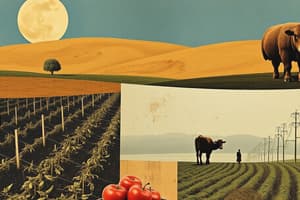Podcast
Questions and Answers
What is the purpose of crop rotation in sustainable farming?
What is the purpose of crop rotation in sustainable farming?
Maintain soil fertility, prevent pest and disease buildup, reduce need for chemical inputs
How does organic farming contribute to sustainable agriculture?
How does organic farming contribute to sustainable agriculture?
Minimize negative impacts on environment and human health
What does IPM stand for in sustainable agriculture?
What does IPM stand for in sustainable agriculture?
Integrated pest management
Why is sustainable farming important in the context of climate change?
Why is sustainable farming important in the context of climate change?
How does sustainable agriculture contribute to food security?
How does sustainable agriculture contribute to food security?
What are some key principles of sustainable agriculture?
What are some key principles of sustainable agriculture?
What is agroforestry?
What is agroforestry?
Define regenerative farming.
Define regenerative farming.
What is precision agriculture?
What is precision agriculture?
Explain the goal of agricultural economics.
Explain the goal of agricultural economics.
What does market analysis in agricultural economics involve?
What does market analysis in agricultural economics involve?
Discuss the significance of integrating sustainable farming practices with agricultural economics.
Discuss the significance of integrating sustainable farming practices with agricultural economics.
Flashcards are hidden until you start studying
Study Notes
Sustainable Farming and Agricultural Economics
In the ever-evolving landscape of agriculture, the importance of both sustainability and economic efficiency is paramount. This article delves into these two interconnected aspects, exploring the strategies and approaches that are shaping the future of farming for a more resilient and prosperous food system.
Sustainable Farming Practices
Sustainable farming, also known as ecological agriculture, is an approach that seeks to improve soil health, conserve natural resources, and protect the environment while ensuring food security and economic viability. This shift in thinking addresses the challenges of climate change, biodiversity loss, and the need to feed an ever-growing global population.
Some key practices and principles of sustainable agriculture include:
- Crop rotation: Rotating crops helps to maintain soil fertility, prevent pest and disease buildup, and reduce the need for chemical inputs.
- Organic farming: The use of natural and organic fertilizers, pest control methods, and crop rotation to minimize the negative impacts of agriculture on the environment and human health.
- Integrated pest management (IPM): A holistic approach to pest control that uses biological, cultural, mechanical, and chemical methods in concert to reduce the reliance on pesticides.
- Agroforestry: The integration of trees and shrubs into crop and animal systems to improve soil health, increase biodiversity, and reduce the risk of erosion.
- Regenerative farming: A holistic approach to farming that focuses on soil health, biodiversity, and integrated livestock management to promote resilient and healthy agricultural systems.
- Precision agriculture: The use of technology, such as remote sensing, GPS, and data analysis, to optimize crop management and reduce waste, input use, and environmental impact.
The adoption of sustainable farming practices can lead to long-term benefits, including healthier soil, increased crop yields, and reduced greenhouse gas emissions.
Agricultural Economics
Agricultural economics is the study of the production, distribution, and consumption of agricultural products, as well as the related policies, markets, and institutions that shape the agricultural sector. The goal of agricultural economics is to understand how farmers, businesses, and governments make decisions and develop strategies to promote economic growth and food security.
Some key areas of agricultural economics include:
- Market analysis: The study of supply and demand, market structure, and the role of government policies in shaping agricultural markets.
- Production economics: The study of the costs, revenues, and profits associated with the production of agricultural products, as well as the factors that influence production decisions.
- Resource economics: The study of the allocation and use of resources, such as land, water, and labor, in agriculture.
- Rural development: The study of strategies and policies to promote economic growth and improve the well-being of rural communities.
- Food security: The study of strategies and policies to ensure that all people have access to adequate and nutritious food.
- Trade and international markets: The study of the impact of international trade on agricultural markets and the ways in which countries can use trade to promote economic growth and development.
The integration of sustainable farming practices with a strong understanding of agricultural economics is crucial for creating resilient and prosperous agricultural systems that can withstand the challenges of climate change, population growth, and globalization.
Conclusion
Sustainable farming practices and agricultural economics are interconnected disciplines that are shaping the future of agriculture. By combining these two areas of focus, we can create a more resilient and prosperous food system that meets the needs of a growing global population while protecting the environment and promoting economic growth.
As we continue to develop new technologies and strategies for sustainable agriculture, it is essential that we also consider the economic consequences of our decisions. By understanding the complex interplay between sustainable farming practices and agricultural economics, we can develop sound policies and strategies that promote food security, economic growth, and environmental sustainability. Agriculture and Food Security: The Importance of Sustainable Practices and Economic Efficiency. (2022). Retrieved from https://www.fao.org/3/cb1594en/cb1594en.pdf Integrated Farming Systems: A Global Perspective on Sustainable Agriculture. (2019). Retrieved from https://www.springer.com/gp/book/9783030109542 Agricultural Economics: Understanding the Economics of Food and Fiber Production. (2021). Retrieved from https://www.cambridge.org/core/books/agricultural-economics/6C12407E6958628E55229C05D6C675C9
Studying That Suits You
Use AI to generate personalized quizzes and flashcards to suit your learning preferences.




